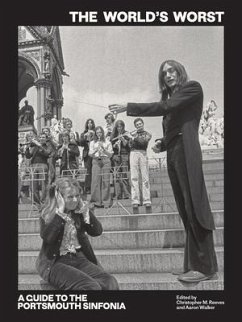In 1970, galvanized in part by the musical experiments of John Cage, Gavin Bryars, and Cornelius Cardew, students at Portsmouth College of Art formed their own symphony orchestra. Christened the Portsmouth Sinfonia, the primary requirement for membership specified that all players, regardless of skill, experience, or musicianship, be unfamiliar with their chosen instruments. This restriction, coupled with the decision to play "only the familiar bits" of classical music, challenged the Sinfonia's audience to reconsider the familiar, as the ensemble haplessly butchered the classics at venues ranging from avant-garde music festivals to the Royal Albert Hall. By the end of the decade, after three LPs of their anarchic renditions of classical and rock music and a revolving cast of over one hundred musicians--including Brian Eno and Michael Nyman--the Sinfonia would cease performing. "The World's Worst: A Guide to the Portsmouth Sinfonia", the first book devoted to the ensemble, examines the founding tenets, organizing principles, and collective memories of the Sinfonia, whose reputation as "the world's worst orchestra" underplays its unique accomplishment as a populist avant-garde project. While seemingly a niche musical anecdote, the story of the Portsmouth Sinfonia engenders wide-ranging conversations that touch upon the legacy of interdisciplinary art pedagogy, the power of popular music, the investment necessary in order to work and learn together, and the effects of destabilizing canonization. The unorthodox journey of the orchestra unfolds here through interviews with original members and their publicist/manager, magazine publications, photographs, and previously uncollected archival material, as well as an essay by Christopher M. Reeves and a foreword by Gavin Bryars.
Bitte wählen Sie Ihr Anliegen aus.
Rechnungen
Retourenschein anfordern
Bestellstatus
Storno


![Orange Blossom Boys: The Untold Story of Ervin T. Rouse, Chubby Wise and the World's Most Famous Fiddle Tune [With CD] Orange Blossom Boys: The Untold Story of Ervin T. Rouse, Chubby Wise and the World's Most Famous Fiddle Tune [With CD]](https://bilder.buecher.de/produkte/59/59810/59810625m.jpg)



